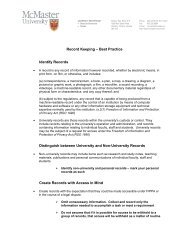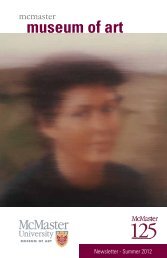Pilgrimage: A Paradigm for Spiritual Formation - McMaster University
Pilgrimage: A Paradigm for Spiritual Formation - McMaster University
Pilgrimage: A Paradigm for Spiritual Formation - McMaster University
Create successful ePaper yourself
Turn your PDF publications into a flip-book with our unique Google optimized e-Paper software.
148<br />
<strong>McMaster</strong> Journal of Theology and Ministry 12<br />
strengthening, but to character <strong>for</strong>mation, which af<strong>for</strong>ds<br />
endurance and perseverance. As in v. 4, the psalmist portrays the<br />
corporate nature of pilgrimage that, in itself, is a source of<br />
strength. Verse 8 suggests that prayer is the means by which the<br />
pilgrims access this strength. Despite following a selah (pause),<br />
v. 9 appears to be a prayer <strong>for</strong> the king who would ideally<br />
provide strength of another kind <strong>for</strong> the people. This section also<br />
connects with Paul’s recognition that the route to his spiritual<br />
destination involves suffering that would be trans<strong>for</strong>med into<br />
spiritual and physical resurrection (Phil 3:10b–11), and that the<br />
route/trans<strong>for</strong>mation is ongoing (Phil 3:12–14).<br />
Verses 10–11 in Psalm 84 return to the sentiments of vv. 1–2,<br />
which express the psalmist’s desire to be in the courts of God.<br />
The posture of humility is reiterated in v. 10b when the psalmist<br />
declares that from his perspective, it would be better to be a<br />
doorkeeper (or to stand at the threshold [NASB] or be an abject<br />
[LXX]) in the house of God, than to dwell in the tents of the<br />
wicked. Conceivably, the psalmist is declaring that it is a matter<br />
of moral choice or intention. This allusion to character is<br />
amplified in v. 11 when it speaks of the protection, favor and<br />
honor that Yahweh provides and bestows upon “those whose<br />
walk is blameless.” Just as Paul strives towards the goal of being<br />
con<strong>for</strong>med to the righteousness of Christ, so Ps 84:11 implies<br />
that the spiritual pilgrimage/walk of God’s people is not just<br />
external, but involves internal matters of character. Finally,<br />
Psalm 84 ends with the idea that the successful completion of the<br />
pilgrimage is dependent on the pilgrim’s trust in God. This<br />
essential component of pilgrimage is inferred in Paul’s confidence<br />
“somehow, to attain to the resurrection from the dead”<br />
(Phil 3:11).<br />
To summarize, McConville’s correspondences between the<br />
external, spatial, and temporal journey, and the inner, spiritual<br />
life are helpful. In each section of Psalm 84, one can observe the<br />
interweaving of the psalmist’s focus on the external, physical<br />
dwelling place of Yahweh, and the internal emotional,<br />
psychological, and spiritual focus or desire <strong>for</strong> God’s dwelling<br />
place, and even <strong>for</strong> the living God himself. This prompts the<br />
psalmist to trust and depend on God in the midst of the Valley of
















